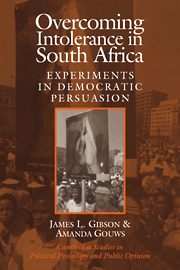Preface
Published online by Cambridge University Press: 22 October 2009
Summary
Regimes attempting to overthrow authoritarianism and replace it with democracy face a host of daunting problems. Citizens may have little experience with or regard for democratic values and practices; elites may be waiting in the wings, ready to steal the state's assets, reimpose dictatorial rule, or both; and the struggle itself may have contributed to a cultural infrastructure very much at odds with peaceful and democratic political competition. It is not surprising that consolidating democratic change is perhaps more difficult than initiating such change.
The problem of political intolerance is one of the most vexing issues for regimes in transition. How does one come to tolerate those who have been responsible for the worst oppression? How is reconciliation possible between those who were masters and slaves under the previous regime? Democracy requires that people with vastly different ideologies “put up with” one another – how do people learn to tolerate ideas they have been taught to regard as evil and criminal? The transition from armed struggle to democracy is never an easy one.
The problem of intolerance plagues all transitional regimes. But nowhere is this democratic deficit more urgent and more real than in South Africa. Apartheid was perhaps one of the world's most strident and insistent ideologies of intolerance. Although apartheid was defeated in South Africa, its legacy persists in many important ways. In the New South Africa, Boers must cooperate with blacks, the African National Congress (ANC) must coexist with the Inkatha Freedom Party (IFP), and whites must somehow come to terms with their minority status and newly found political impotence.
- Type
- Chapter
- Information
- Overcoming Intolerance in South AfricaExperiments in Democratic Persuasion, pp. xiii - xviPublisher: Cambridge University PressPrint publication year: 2002



